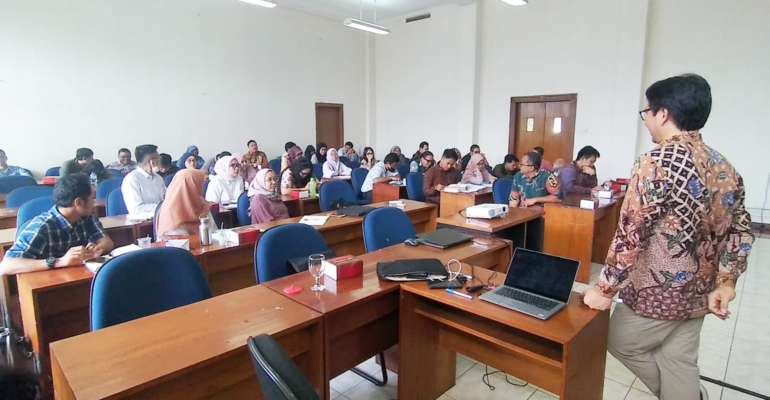MPD Study Program of SPs IPB University Holds Public Lecture on the Importance of Corruption Risk Management in Local Government

The Study Program (Prodi) of Regional Development Management (MPD) of the Graduate School (SPs) of IPB University held a public lecture with the theme ‘Corruption Risk Management in Local Government (Pemda)’. The event was located at Baranangsiang Campus, Bogor.
The event presented speakers Dr Arief Tri Hardiyanto (Inspector General of the Ministry of Communication and Information), Prof Dedi Budiman Hakim (Professor of IPB University) as moderator, Prof Ma’mun Sarma (The Chairman of MPD Study Program) and 35 students and alumni.
Dr A Faroby Falatehan, Chairman of MPD IPB University in his speech said, according to demographics or psychological characteristics, the profile of the perpetrators of corruption is not different. It can even occur from profiles such as honest people. This crime of corruption is a retrospective risk that can be repeated, both in plain sight and in secret.
“Therefore, we carry out this activity so that in planning the Regional Government, the risk of corruption or corruption risk management can be carried out. Thus, each LG can mitigate the crime of corruption,” he added.
He explained that currently the government is trying to minimize corruption. IPB University MPD Study Program’s participation in reducing corruption that can occur in government is carried out with mitigation efforts, especially starting at the planning stage.
“The concept of corruption risk management is expected to be used as one of the considerations for students and alumni of MPD Study Program of IPB University in carrying out their activities. Prevention is through the connecting the dots model, which means there must be a connection between mitigation efforts and activity plans,” he explained.
Meanwhile, Dr Arief Tri Hardiyanto explained that in avoiding corruption, one must be able to understand what corruption is and its characteristics first.
“Some types of corruption are state financial losses, including bribery, embezzlement in office, extortion, fraudulent acts, conflict of interest in procurement and gratuities,” he said.
He explained, of the several types of corruption most often encountered is gratification. A person is usually not aware of this gratification. “Sometimes we receive these gratuities without distinguishing whether this is because of us or because of our position,” he explained.
Dr Arief added that corruption is wrong and against the law. Corruption is done in various ways such as hiding, deceiving, cheating with the intention of deliberately and to benefit other parties and can harm other parties.
“This can be analyzed from the elements of actus reus and mens rea. Actus reus is a guilty or unlawful act which is the outer element of a crime, while mens rea is the fault or mental element of a crime,” he added. (HBLRz) (IAAS/TNY)



